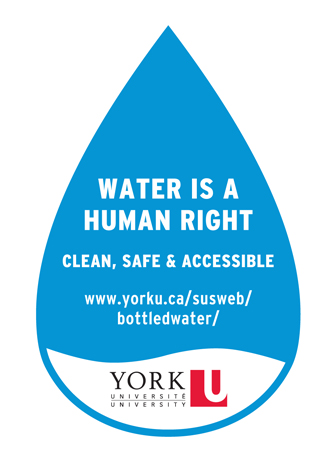 York University takes back the tap this September with the phaseout of the sale of single-serve bottled water on the Keele and Glendon campuses.
York University takes back the tap this September with the phaseout of the sale of single-serve bottled water on the Keele and Glendon campuses.
“The University’s commitment to phase out the sale of bottled water is an important part of York’s global leadership in sustainability, social responsibility and justice,” says Pamela Persaud, chair of the York U Bottled-Water Free committee.
Currently, 18 University departments, including the Office of the President, the Faculty of Environmental Studies and Human Resources, have gone bottled water free. In addition to more than 200 water fountains, the University has installed 70 water refill stations with more to come.
The Canadian bottled water market is comprised of two types, spring water and processed water. Bottled water costs up to 10,000 times more than tap water. Brand name bottled water costs between $1.50 and $2.50 per bottle. Water is brought to our homes for less than one cent per litre and most of the cost incurred in producing a single-serve disposable bottle of water is mostly made up of packaging, shipping and marketing.
The United Nations Committee on Economic, Social & Cultural Rights states that the human right to water is indispensable for leading a life in human dignity and is a prerequisite for the realization of other human rights.
The campaign leading up to the phaseout included an information campaign. Faculty, staff and students are encouraged to bring their own reusable, refillable bottles to campus. The water available through the University’s refill stations and water fountains is clean, safe and refreshing. Choosing to use a refillable water bottle is an investment in future generations, and it demonstrates that York University is committed to preserving and protecting the environment.
In the city of Toronto, some 100 million plastic water bottles are used, with up to 35 per cent going to landfills. Plastic water bottles take up to 700 years to begin composting. More than four billion pounds of plastic from water bottles finds its way into landfills, and these water bottles release toxic chemicals that pollute not just watersheds, but also the air we breathe.
Most water in single-serve bottles is filtered municipal tap water.
The initial commitment to phase out the sale of bottled water was made in the form of a pledge signed in 2012 by York President and Vice-Chancellor Mamdouh Shoukri and Vanessa Hunt, then president of the York Federation of Students. The pledge covers all operational units and food vendors at the University and is being coordinated by a pan-University committee.
University community members can learn more about the pledge by visiting bottledwater.info.yorku.ca.


